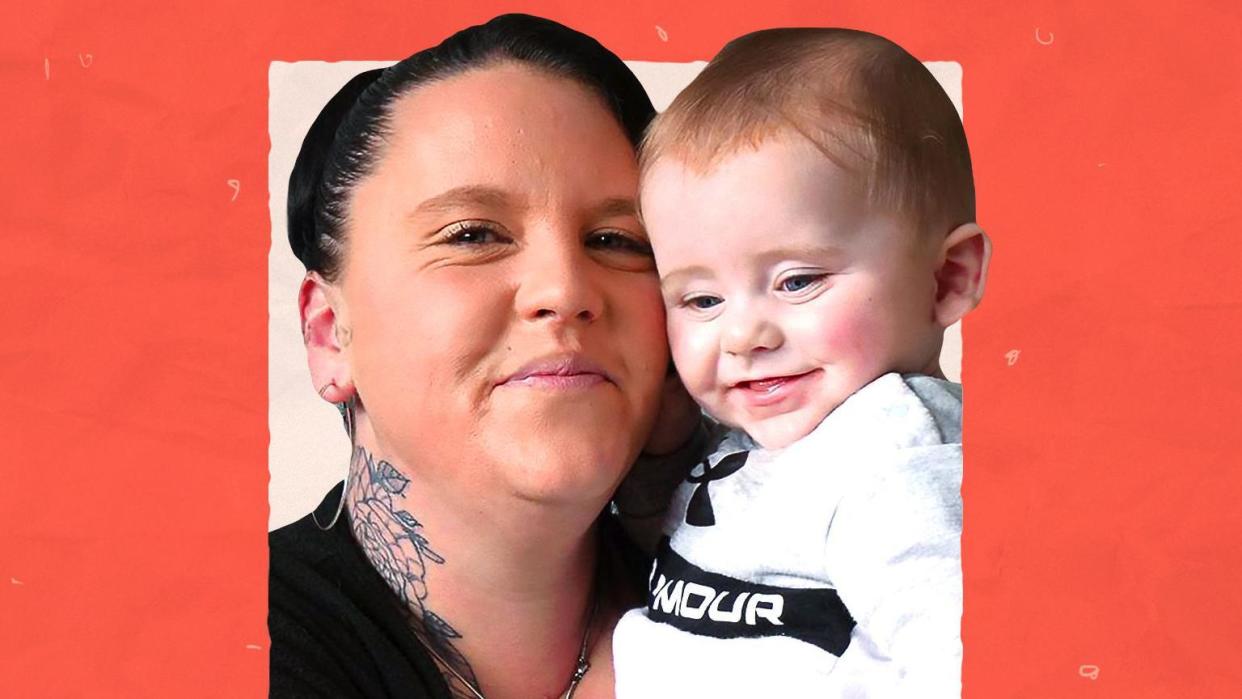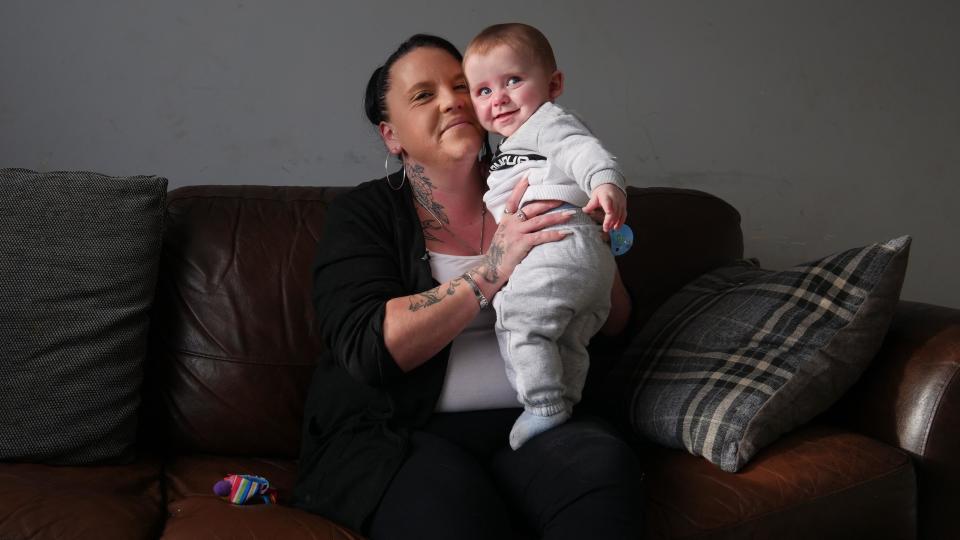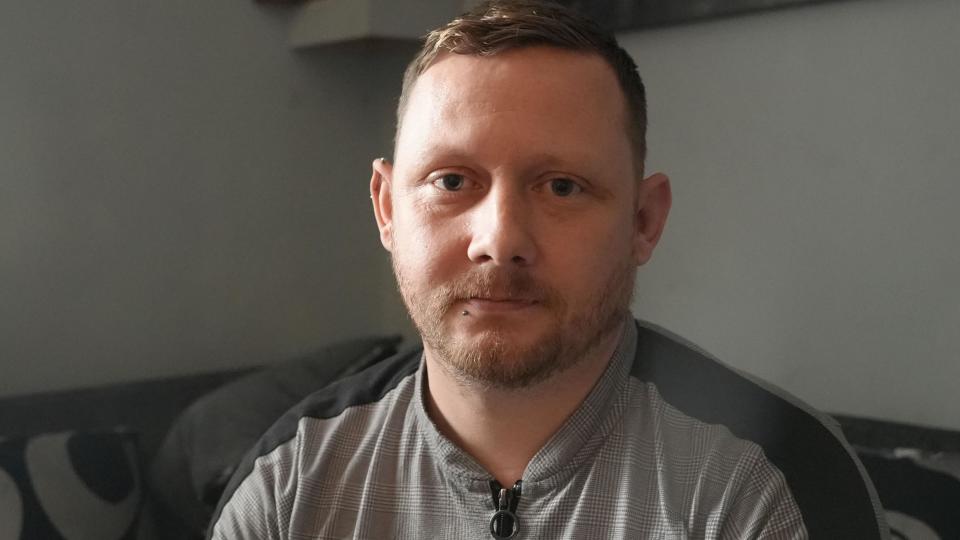How one council bucked the rise of kids in care

"You’ve got no right to judge, we’re still parents and that’s our baby that’s just been taken."
Two of Kayleigh’s seven children moved into care after she was in a volatile relationship.
They are among more than 107,000 children in care in the UK - a rise of 16% over 10 years.
Wales has seen an increase of 79% in 20 years, but one council is bucking the trend.
In 2012, Neath Port Talbot (NPT) council in south Wales had more than 500 children in care - the highest rate in the country.
Since then, it has halved the number of children in care and has one of the lowest rates in Wales, despite contacts to the team increasing by 53%.
BBC News has spent a year-and-half looking at what it is doing differently, speaking to an emergency social worker, families who have worked with social services and a 15-year-old girl who talks about her experience of being taken into care.
As Kayleigh, 35, sits cuddling her baby on the sofa, it is difficult to picture her two eldest children going into care.
She said it felt like her heart had been ripped out when they left.
"I honestly felt a darkness I’ve never felt before. It’s really, really hard. Ask any mother about having a child taken away, you don’t see the point in living," she said.

Teatime at Kayleigh's house in south Wales is a juggle, but also a well-oiled routine.
When we visit, she is teaching her eldest daughter to make chicken fajitas while the others draw, read or play computer games.
All of this happens while Kayleigh prepares baby food, washes the dishes and does a load of laundry.
It is a happy and lively atmosphere.
She also sees her two children in care regularly and they have a good relationship.

The number of children in care is on the rise. But can one council do things differently, and keep families together?
Watch on iPlayer now or on BBC One Wales at 22:40 on Wednesday 3 July.

Things have improved for Kayleigh in part due to one of the projects that supports families in south Wales.
The Parenting Advocacy Network (PAN) runs a parent cafe, facilitated by social workers, but led by parents who have all had social services involvement in their lives.
Kayleigh said it had given her confidence and a second family - free from judgement.
Being judged by others - even in earshot of her children in the playground - is something Kayleigh is used to, but does not bother her so much anymore.
"My kids are happy, healthy and they all know I love them to bits," she said.
"I might be a single mum to seven kids, but I’m smashing it. I’m doing it."

Helping stay together is a priority for Neath Port Talbot (NPT) council, according to the head of children and young people services Keri Warren.
Care is incredibly expensive and outcomes for care-experienced children are not always positive.
When Keri joined the senior management team at NPT in 2012, she said it was a "very difficult place to work", with high caseloads and low morale.
Keri focused on retaining experienced staff and intervening early with families, very few of whom deliberately hurt their children, she said.
Most are under pressure and need help.
And what her team is doing is nothing "big and clever", she said, adding they had gone back to basics with "good old-fashioned" social work.
Social workers identify what the issues are – whether it’s a volatile relationship, an addiction or a dirty house unsuitable for children to live in – and then set about with a team to help that family turn things around.
"If they get help at the right time with the right approach, we’ve had some very good outcomes with families that perhaps historically would have ended up either in the child protection arena or with their children in foster care," she said.
In 2023, there were 107,057 children in care in the UK, a rise of 16% over the past 10 years.
They live with their family under a care order, in foster or kinship care or in children’s homes.

Lauren said it "hit her like a bomb" when she heard she was moving into care, aged 11.
Four years on, Lauren said she was happy about being in care and was starting to feel safe again.
"I felt positive, I felt loved and that really helps me feel happy again," she said.
"I never thought I’d make it to my teenage years to be honest, but I’m turning 15 soon so it’s like, wow, I am actually doing it. I’m making it."
Lauren now campaigns for change for children in care, with Neath Port Talbot’s Hope project – a girls' rights group that aims to give children who have been in care a voice.
She said the group was like her second family.
Lauren is one of 7,210 children in care in Wales, a number that has risen by 79% over the past 20 years.
The cost of residential care in Wales alone has risen from £65m in 2017-18 to £200m this year.
NPT has reduced spending on care placements from £13.1m in 2012-13 to £9.1m in 2023-24.
Rather than spending money on expensive residential care and court cases to remove children, Neath Port Talbot invests in services to keep families together where possible.

Often that starts with Linda Davies, a team manager in social services.
She spends evenings and weekends at home answering calls from people who need urgent help and often it can be a child protection referral from the police.
When we film with her on shift, she gets a call relating to concerns about a baby who has a bruise.
She visits the mum and baby to assess if the baby is at risk.
When she meets us afterwards, Linda tells us she is reassured the baby is safe and refers the family for more support.
Linda said sometimes there is pressure to remove children, but it is her job to slow that process down wherever possible.
"The evidence is there, they gravitate back to their families, the outcomes are not great for children in foster care," she said.
"It’s also doing away with the myth that social workers just remove children, that we’re child snatchers, that’s a wrong impression of social work."

Lorry driver Gaz has a good relationship with social services now but that was not always the case.
“I had a lot of hatred with social services because I feel they took my childhood away," he said.
After spending time in the Army, he is now settled with a partner, a son and a stepson, who has additional learning needs.
By his own admission, Gaz struggled to be a good dad initially and different parenting styles caused conflict with his partner which would sometimes lead to the police being called.
At first, he struggled to ask for help, but was inspired by his partner and has since attended a number of courses run by family workers who have helped him deal with confrontational situations at home.
Gaz said he now "strikes when the iron is cold".
"It was hard at the start, because men don’t cry or ask for help, but I was relieved because I had someone to listen [who was] willing to help me," he said.
"I’m committed to my job, to my partner, my kids. I’m a parent now, I’ve got to be a role model."
He lives by a saying taught to him on the course: "Monkey sees, monkey does."
And he has changed his reactive approach to parenting and tries to stay calm, which has transformed his relationship with his stepson.
"He calls me 'the fun daddy' now, not 'the grumpy daddy', and that melts me," he said.
"We’re a team. We’re building memories. He loves me and I’m really proud of him."
Despite these successes, the pressure on the council is increasing.
Tata Steel is cutting 2,800 UK jobs - the bulk of which are in Port Talbot.
A report found it could affect as many as 6,800 jobs in the area.
Keri and the team will continue their focus on supporting families through turbulent times.
"The downward trajectory continues and what we’ve said is those children that need to be looked after, will be looked after," she said.
"What we’ve been able to do over the years is build up a workforce that is experienced. There’s no substitute."


